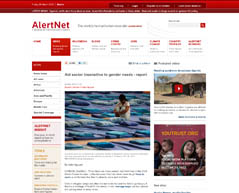March 8, 2012
Source: AlertNet
 Three times as many women lost their lives in the 2004 Indian Ocean tsunami – often because they had never been taught how to swimor climb trees like their husbands, sons and brothers.
Three times as many women lost their lives in the 2004 Indian Ocean tsunami – often because they had never been taught how to swimor climb trees like their husbands, sons and brothers.
Girls in refugee camps are often the last to be fed and the first to go hungry if there’s a shortage of food for the family. In war, teenage boys can be coerced into joining rebel or army ranks.
For anyone working in emergency response, these issues are depressingly familiar. Or should be, given how much is documented about communities swept up in conflict and natural disasters – from Haiti to Pakistan and Somalia.
Yet time and again humanitarian actors are failing to take into account the different needs of women and girls (and equally men and boys) – an oversight that can exacerbate their suffering, DARA said in a report released on Wednesday.
The Madrid-based group, which assesses donor performance and aid effectiveness, said progress in developing greater sensitivity to gender issues both in emergency response and longer-term recovery efforts has been too slow.
It blamed three factors for this failure.
1) The humanitarian sector is too male dominated. In its 2011 Humanitarian Response Index, DARA noted that 68 percent of the senior managers it interviewed were men. Some of the comments made to DARA researchers suggest the men just didn’t get it. “Men wouldn’t understand why it was important to put locks on latrine doors. They thought it was just so the wind wouldn’t open them,” one aid worker told DARA. Other respondents gave credit to senior male staff for pushing the gender agenda but complained that female staff attempting to do the same were often seen as doing it for personal or emotional reasons.
2) Gender is often considered a low priority in emergency responses. Many players, DARA said, saw gender as an “added luxury” – optional, depending on timing and resources. This view isn’t helped much by donors themselves. “In truth this is not a priority; it’s more of a ‘tick the box’ approach,” said one donor representative in Somalia. “The scale and complexities of the crisis mean there are more important issues to address.”
3) Gender is still mainly equated with women’s issues and not as a comprehensive strategic approach to programming. In other words, men and boys should not be forgotten. In Democratic Republic of Congo, the needs of men and boys, many of them subjected to rape and sexual assault, are often overlooked in sexual and gender-based violence programmes, DARA said. “Gender is not about underlining the vulnerability of women or constantly showing them as victims,” one respondent said. “We need less talk about gender and more about gender in projects tackling the needs of all men, women, boys and girls.”
LESS EFFECTIVE RELIEF
In a foreword to the report, the executive director of the U.N. women’s agency (UN Women), Michelle Bachelet recognised that the humanitarian sector had made some improvements. For example, channelling food aid to women or offering them fuel-efficient stoves so they wouldn’t have to expose themselves to danger while gathering firewood.
But these measures, she argued, needed to be financed and implemented in a much more systematic way.
“Far too many people still wrongly assume that the specific threats faced by women should be addressed once broader security issues are solved; that their voices should be heard once peace is consolidated,” Bachelet added. “The opposite is true.”
“As humanitarian disasters become more frequent and more devastating, failure to put women’s safety and empowerment at the centre of responses will undermine the effectiveness of relief efforts,” she said.
(Editing by Maria Caspani)
Share this